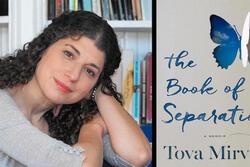From Rural Pennsylvania to Rio de Janeiro
When my father’s cousin entered our small synagogue in rural Pennsylvania, I wasn’t the only one who stared. In our rundown Rust Belt town near the border with West Virginia, women didn’t show up for Saturday morning services in tailored white wool jackets or carrying an angular black handbag with a metal clasp large enough to double as a weapon. The occasion was my older sister’s bat mitzvah. Eleven years old at the time and trapped in a hand-me-down dress with built-in shoulder pads, I was transfixed.
I knew the woman who entered had to be the cousin of my father’s from New York who worked in advertising. We hadn’t seen much of his extended family in the four years since my parents had divorced and we’d begun moving anxiously between them. If I wasn’t missing one parent, I was longing for the other. I started to spend more time sealed up in my room, reading and writing endless poems. When my father’s cousin Liane arrived from New York for my sister’s bat mitzvah, I assumed she would concentrate on the various adult relatives from my father’s side who were milling about before the service began. There was no reason for her to seek out her awkward ten year-old second cousin standing alone biting her nails.
But Liane did. She told me she’d heard from my father that all I did was read and it was one of her favorite things to do as well. At the oneg afterward, she sought me out again and listened to my thoughts on Judy Blume as seriously as if I were discussing a dissertation on Emily Dickinson. When I asked what it was like to work in advertising and ride an elevator to her home, she offered for my sister and me visit her in Manhattan.
I had a feeling that Liane was too distant a relative for such a trip to materialize, and it didn’t. Yet as I prepared for my own bat mitzvah a few years later, and all through my school years after that, Liane’s kind attention that morning in the lobby of our synagogue stayed with me. When I applied to college in New York, I thought of her. In a first year seminar at Barnard, when I came across Simone Weil’s declaration that attention is the highest and purest form of generosity, I underlined it and wrote in the margin Liane.
Like most people with a complicated childhood, I never managed to fully shed the anxiety of those years. In my bookish way, I decided what I needed to genuinely reinvent myself was an entirely new language, to experience the world in a different syntax and set of words.
Instead of joining Barnard’s English department, I went over to Comparative Literature instead, learned Spanish, and got a job teaching English in Chile after graduation. I married a Chilean from a large Sephardic family who had never heard of the Rust Belt. After our wedding, we took off for the north of Brazil, an idea driven in large part by my curiosity about the Brazilian Jewish writer Clarice Lispector. In Lispector’s novel The Passion According to G.H., which I later came to translate, I came across a line in which I recognized what I’d done in my adolescent years with my fantasy notion of Liane’s life in New York. “Until now,” Lispector wrote, “finding myself was already having an idea of a person and fitting myself into it.” In the novel, Lispector’s narrator comes to realize the childishness of this method and begins to pursue instead the “great effort of construction that is living.”
In the decades since first seeing Liane in our tiny rural synagogue, I’d learned that my sister had had a similar experience with Liane that same morning at the oneg and we both felt a debt to her that we’d never expressed to anyone but each other. Liane had fulfilled some role that day neither of us had known we needed in that crowded lobby seeing many relatives for the first time since our parents’ dramatic separation: for someone who was mostly a stranger to come over and make us feel that there was nothing inherently pitiful about us and no reason we couldn’t grow up to become whoever we wanted to be.
When Liane died of cancer three years ago, her sister Fern asked my sister and I if we’d like to come by Liane’s apartment to pick out some of her extraordinary clothes and scarves to keep in our lives. My sister and I were now both living in Brooklyn several blocks from each other and got our children together every Friday with our two families. For the first few Friday dinners after we went to Liane’s apartment, we both made a point of wearing something of hers and would a send a picture to her sister Fern.
Last February, after a decade translating Brazilian writers, I published a novel of my own about a translator, Emma Neufeld, who leaves Pittsburgh for Rio de Janeiro. The enigmatic author she’s been translating since graduate school, loosely based on Clarice Lispector, has inexplicably disappeared into an almond tree with a suitcase and a cigar. Before my first public reading from the novel, I buckled myself into a belt of Liane’s as if it were a seat on a plane. My sister came to the launch with one of Liane’s silk scarves draped over her coat. We smiled at each other across the bookstore, recognizing the other’s desire to arrive infused with some of Liane’s boldness but also her genuine interest in others, in the selves we all painstakingly construct.
This piece was originally published in the 2018 issue of Paper Brigade, a publication of the Jewish Book Council. It is reprinted in online form exclusively on jwa.org, with permission by the author.







